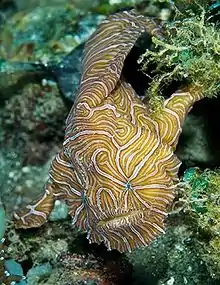Histiophryne
Histiophryne is a genus of frogfishes found in waters ranging from Taiwan to South Australia. There are currently three known species. These fishes are easily distinguished from other anglerfishes as having a reduced (or missing) luring appendage, a highly evolved form of the first dorsal fin spine. The second and third spines are immobile and reduced as well to mere bumps beneath the skin. The rear fins extend past the body of the fish and meet its tail fin.[1]
| Histiophryne | |
|---|---|
 | |
| Psychedelic Frogfish (Histiophryne psychedelica) | |
| Scientific classification | |
| Kingdom: | Animalia |
| Phylum: | Chordata |
| Class: | Actinopterygii |
| Order: | Lophiiformes |
| Family: | Antennariidae |
| Subfamily: | Histiophryninae |
| Genus: | Histiophryne T. N. Gill, 1863 |
Species
There are currently five recognized species in this genus:[2][3]
- Histiophryne bougainvilli Valenciennes, 1837 (Bougainville's anglerfish)
- Histiophryne cryptacanthus M. C. W. Weber, 1913 (Cryptic anglerfish)
- Histiophryne maggiewalker R. J. Arnold & Pietsch, 2011 (Queensland frogfish) [4]
- Histiophryne pogonius R. J. Arnold, 2012 [3]
- Histiophryne psychedelica Pietsch, R. J. Arnold & D. J. Hall, 2009
References
- Pietsch, T.; Arnold, R. & Hall, D. (2009). "A bizarre new species of frogfish of the genus Histiophryne (Lophiiformes: Antennariidae) from Ambon and Bali, Indonesia". American Society of Ichthyologists and Herpetologists. Retrieved March 1, 2009.
- Froese, Rainer and Pauly, Daniel, eds. (2012). Species of Histiophryne in FishBase. April 2012 version.
- Arnold, R.J. (2012). "A new species of frogfish of the genus Histiophyrne (Teleostei: Lophiiformes: Antennariidae) from Lombok and Komodo, Indonesia." Zootaxa 3253: 62-68.
- Arnold, R.J. & Pietsch, T.W. (2011). "A new species of frogfish of the genus Histiophryne (Teleostei: Lophiiformes: Antennariidae) from Queensland, Australia." Zootaxa 2925: 63-68.
This article is issued from Wikipedia. The text is licensed under Creative Commons - Attribution - Sharealike. Additional terms may apply for the media files.